

Are you an educational creator looking to monetize your expertise by teaching others online? With the rise of microlearning, it’s never been easier to package your knowledge into bite-sized, engaging lessons that learners can access anytime, anywhere. But with so many microlearning platforms out there, which one should you choose to host and sell your courses?
This post will explore 13 of the best microlearning platforms for creators and instructors in 2024. We’ll cover what makes a good microlearning solution and highlight each platform’s key features, pros, and cons. Plus, we’ll share tips on how you can profit from the booming microlearning trend. Let’s get started!
Before we get to our list, let’s define microlearning and what to look for in a microlearning platform. Microlearning involves delivering educational content in small, specific bursts that put the learner in control of what and when they learn. A typical microlearning session lasts 3-7 minutes and focuses on a single learning objective.
RPS Research states that microlearning can boost knowledge retention by up to 80%. And according to Software Advice, it can increase learner engagement by 50%. No wonder it’s become such a popular training method. The global microlearning market is expected to grow to $2.7 billion by 2024.
To deliver effective microlearning, a platform should have the following key attributes:
The best microlearning platforms combine an intuitive course creation experience for instructors with a slick mobile app for learners to access content on the go. Let’s see how the top platforms stack up.
Here are our picks for the 13 best microlearning platforms for creators and businesses in 2024.
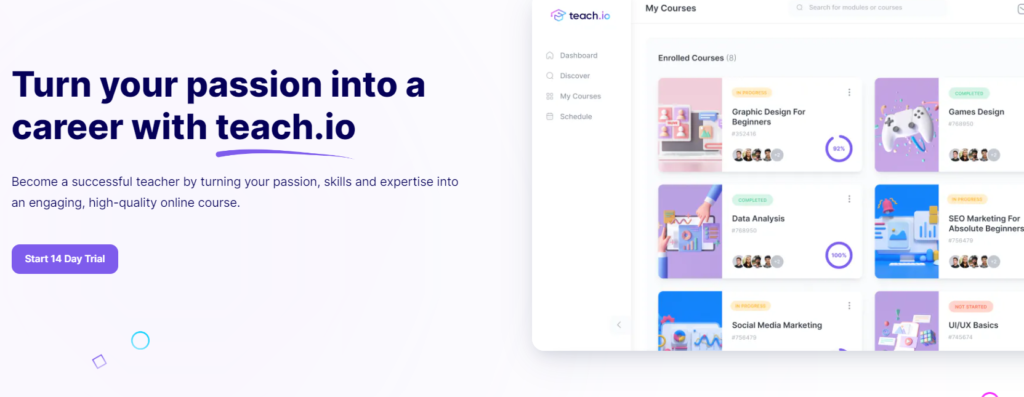
Teach.io is a powerful microlearning platform that lets you build a branded online school or learning community to educate your audience and customers. More than just a course platform, Teach offers a complete community engagement system, including discussion forums, member profiles, course reviews, certificates, member messaging, and more.
What sets Teach apart is its focus on community-based learning. You can create unlimited courses and structure them with sections and lessons containing video, audio, PDFs, quizzes, and assignments. Learners can interact with you and each other around your course content.
The #1 to make money online with TikTok Search (FREE TRAINING)

Teach.io’s community-driven approach makes it ideal for creators, coaches, and businesses who want to cultivate a community around their educational content. The ability to deeply engage learners and gather rich data on them is a huge value-add.
Start your 14-day free trial today.
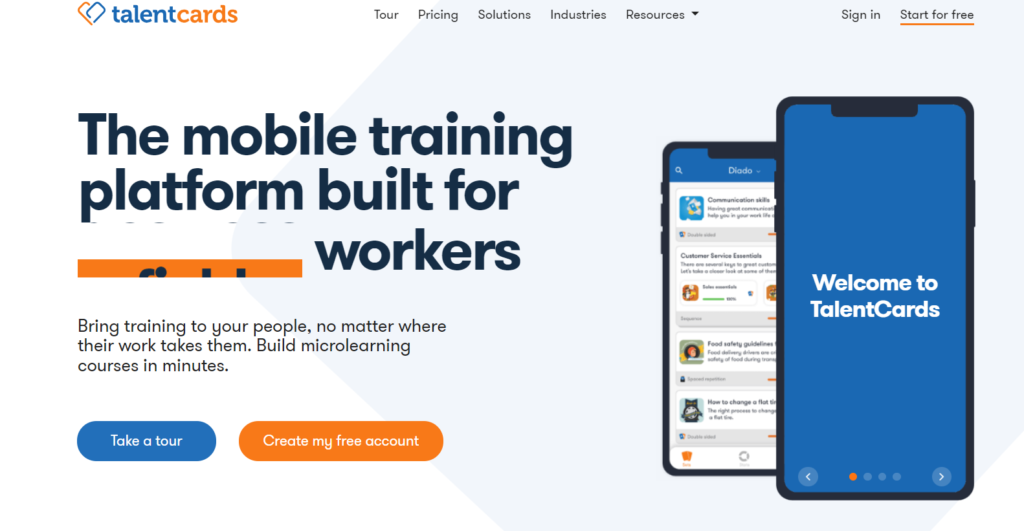
TalentCards is a mobile-focused microlearning platform designed for employee training. It lets you quickly turn existing training material into gamified micro courses delivered to learners’ phones.
Courses are built as decks of “cards,” each containing bite-sized information in the form of text, images, videos, quizzes, or surveys. The cards can be standalone or organized into learning tracks for more comprehensive training.
TalentCards is best for companies who want to repurpose existing training content into mobile-friendly microlessons.
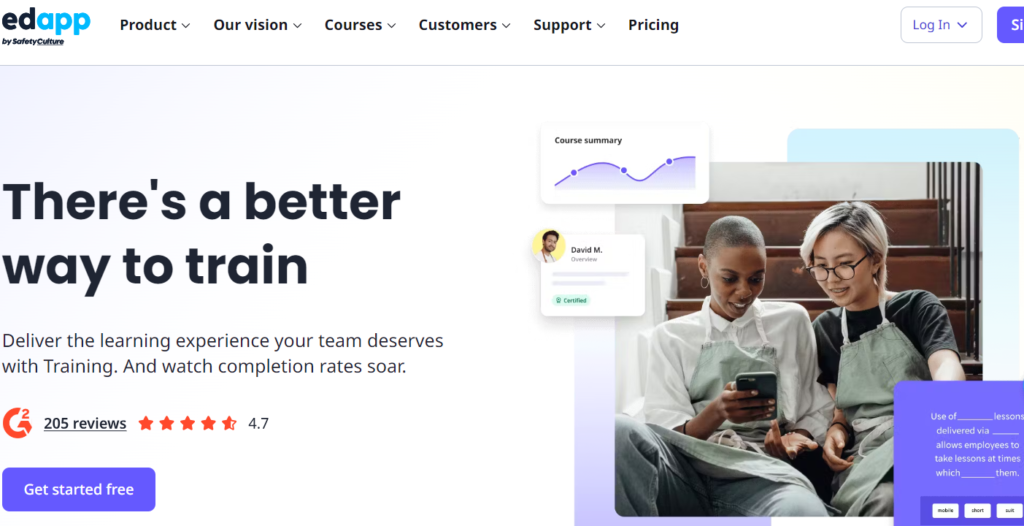
EdApp is another corporate microlearning solution with a slick mobile app for delivering training. Acquired by SafetyCulture in 2020, it’s now used by major brands like Mercedes, Shell, and the United Nations.
Like TalentCards, EdApp uses a card-based format for lessons. You can enhance your microlessons with games, quizzes, and course assessments. There’s also an in-app prizing feature to reward learners with real or virtual gifts.
If you want an easy way to create interactive, gamified microlessons for employee onboarding and training, EdApp is worth checking out. The unlimited free plan is great for small businesses. Paid plans start at $1.95/user/month.
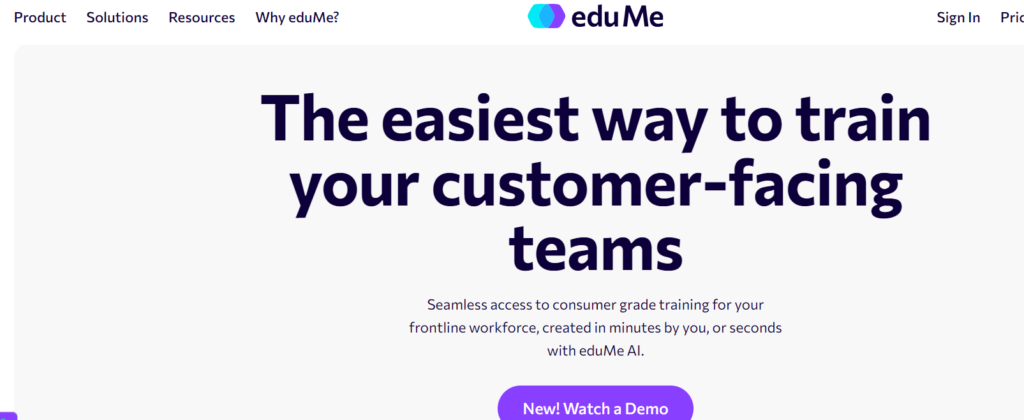
EduMe is a mobile-first training platform that prioritizes user experience. Originally built for the diskless workforce, it’s now used across industries to train employees, customers, and more.
What’s great about EduMe is how easy it is to create good-looking, engaging microlessons. You can add various content blocks like text, images, videos, quizzes, and simulators to a scrollable lesson. The in-app branding and notifications are also highly customizable.
EduMe is a solid platform for microlearning-based employee and customer education. It doesn’t have all the features of a full-fledged LMS, but that’s by design.
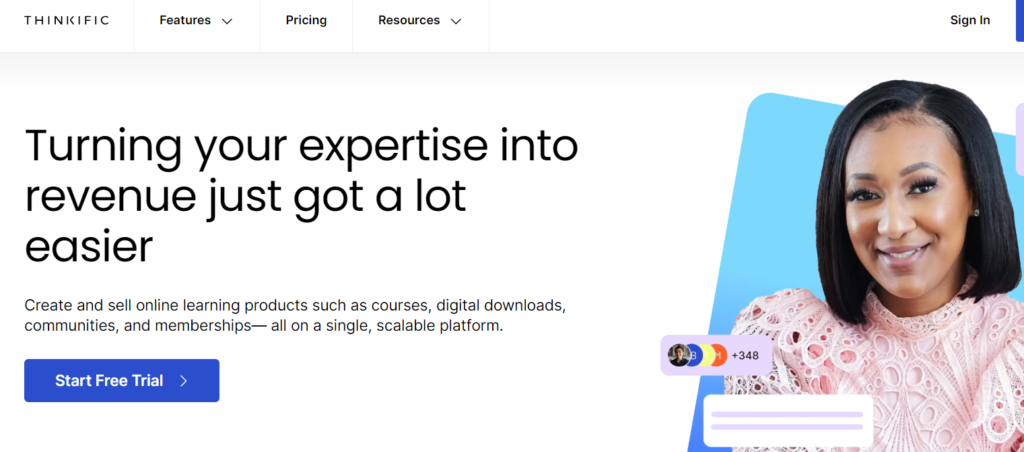
Thinkific is a leading online course platform that allows you to package your educational content into short-form lessons for bite-sized learning.
While not exclusively a microlearning solution, Thinkific does let you structure lessons in multiple short modules. You can add different content types like video, text, quizzes, surveys, PDFs, and assignments to create an engaging learning experience. Courses can be sold for a one-time fee or subscription.
If you’re an individual creator who wants to offer your courses in easily digestible micro-modules, Thinkific can work well. Just be mindful of how you structure content for a true microlearning experience.
The Leap, previously known as Virtually, is an emerging microlearning platform aimed at helping experts quickly launch live cohort-based courses.
You create a course outline with short lessons of 1-15 minutes, each covering a single concept or skill. Lessons can include videos, images, and files. During a live cohort, you deliver the lessons in scheduled sessions while interacting with students via video, chat, and polls.
The Leap is purpose-built to deliver live micro-learning experiences, making it unique among online course platforms. If you want to teach short, live lessons and nurture an intimate learner community, it’s worth applying for early access.
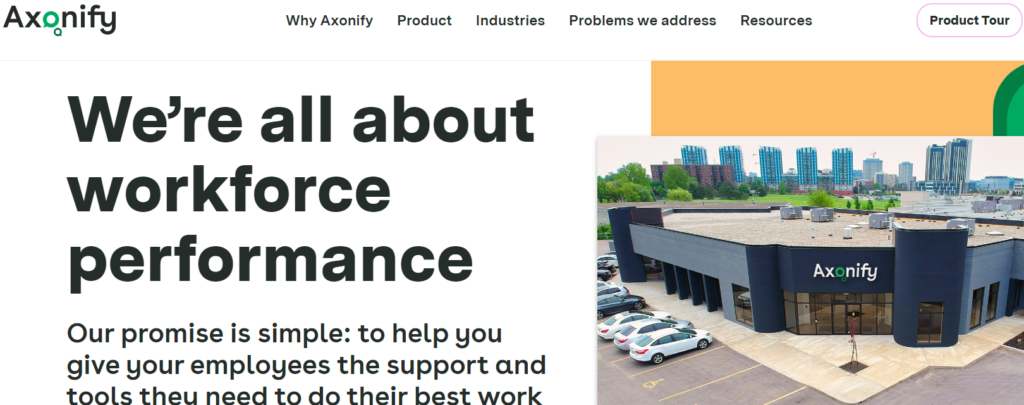
Axonify is an employee training platform that uses advanced learning science principles to deliver personalized microlearning. Geared toward large enterprises, it’s used by major companies like Walmart, Bloomingdale’s, and Merck.
Axonify’s AI engine adapts the training to each employee based on their knowledge gaps, performance, and behaviors. Admins can create question-based micro courses that incorporate video, images, and SCORM content. Employees access daily 3-5 minute training sessions via web or mobile app.
As a sophisticated enterprise training solution, Axonify won’t be the right fit for solo creators or small businesses. (In that case, you’re better off using something like Teach.io). However, it’s one of the best platforms available for larger companies who want to maximize employee performance through data-driven microlearning. Expect to make a significant investment.

OttoLearn is a specialized microlearning platform that delivers training to desk and deskless workers. It’s a division of Neovation Learning Solutions, a leading provider of corporate training.
Courses in OttoLearn are broken down into 2-minute microlessons that adapt to each learner’s mastery level. You create lessons with different “mastery triggers” that learners must demonstrate to complete the lesson. The lessons persist from any device, allowing continuous learning.
For companies who want to cut training development time while increasing knowledge retention and job proficiency, OttoLearn is a compelling microlearning solution. Just know that it’s not a complete replacement for a LMS. Contact the company for a demo and pricing.

Udemy is the world’s largest marketplace for online courses, and it has over 50 million students. While it’s not mainly a micro-learning platform, you can certainly use its course creation tools to build micro courses.
Udemy lets you add various content types like video, quizzes, assignments and coding exercises to your course. Courses are divided into sections and lectures. For a micro course, you would create short, 2-5 minute lectures each covering a specific learning objective.
If you don’t want the hassle of marketing and selling your courses, creating a micro-course on Udemy could help you reach a large student base. But you’ll be competing with 150,000+ other courses. Consider using Udemy in addition to other platforms.
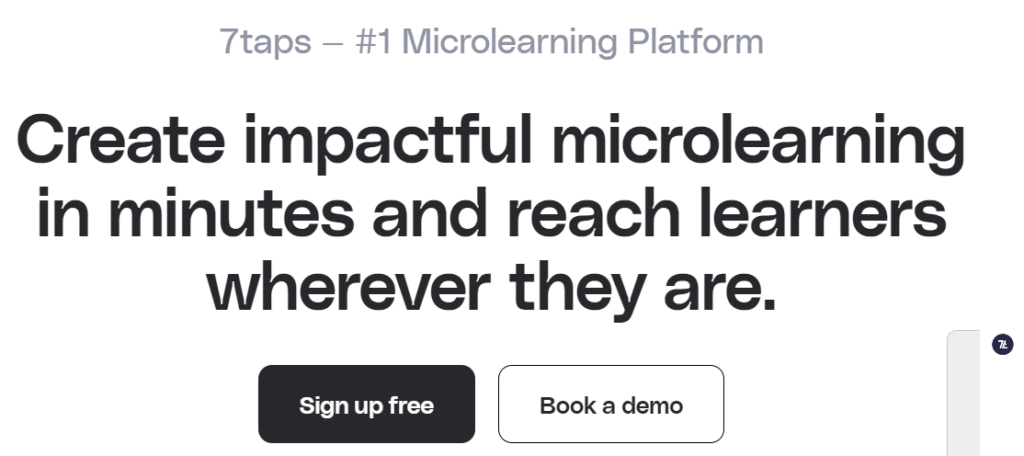
7taps is a mobile-first microlearning platform that allows you to create and deliver bite-sized lessons to learners. Its unique approach involves chunking content into short “taps” that learners can quickly consume on the go.
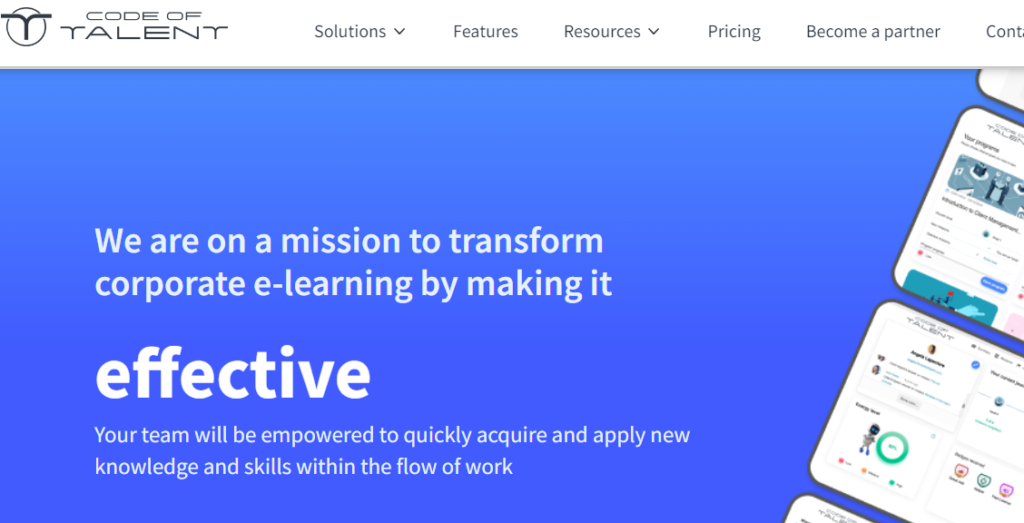
Code of Talent is a microlearning platform with a focus on social and collaborative learning. It combines bite-sized lessons with features like live streaming, breakout rooms, and peer learning groups to foster an interactive learning experience. Courses can be created with the drag-and-drop editor and enhanced with gamification elements.
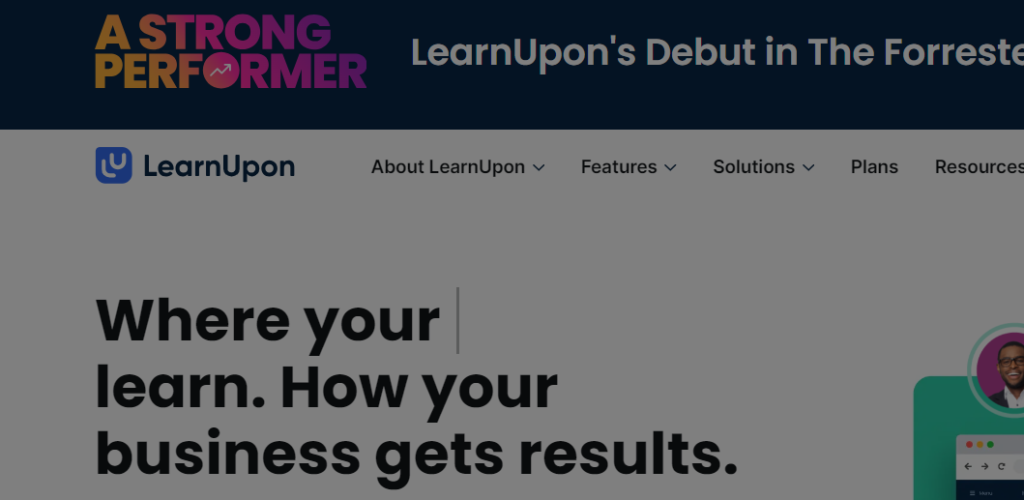
LearnUpon is an LMS that offers microlearning capabilities alongside more traditional e-learning features. Its micro course creator allows you to string together different content types like text, images, videos, and quizzes into short learning paths. Major brands like Zendesk, Twilio and Vauxhall trust the platform.

Tovuti is an all-in-one learning management system that includes microlearning support. The simple course builder allows you to create short, interactive courses and personalize the learning path for each user. The platform also offers interactive elements like virtual classrooms, discussion boards, and built-in content authoring.
The #1 to make money online with TikTok Search (FREE TRAINING)

Now that you know the top microlearning platforms, how can you, as a creator, tap into this massive trend? Here are a few ideas.
The key is to remember that microlearning is ultimately about quickly delivering a desired result. If you can package your expertise into bite-sized lessons that help people achieve a specific goal, you’ll be well-positioned to profit in this growing market.
This post covered a lot, from what makes an effective microlearning platform to some of the top solutions available for creators and businesses. To recap, here are the best microlearning platforms for 2024:
Each platform has its strengths, so the “best” one will depend on your specific use case and audience. Solo creators will have different needs than a large enterprise.
That said, Teach.io offers the most well-rounded solution for monetizing your expertise through microlearning. With Teach, you get a fully customizable branded web portal and mobile apps, a robust course builder, integrated community features, multiple monetization options, and hands-on support to ensure your success.
Whether you’re an experienced creator looking to scale or you’re just getting started with online courses, Teach.io gives you everything you need to build a profitable micro-course business. You can try the platform free for 14 days – no credit card required.
The future of learning is undoubtedly micro. Busy professionals need relevant skills training delivered in short, engaging bursts that fit their schedules. On the other side, creators and businesses can reach more people by unbundling their expertise into bite-sized learning units.
By hopping on the microlearning train now, you’ll be ahead of the curve and well-positioned to impact more lives while increasing your income. The key is to choose the right tech stack to bring your micro-courses to the masses.





